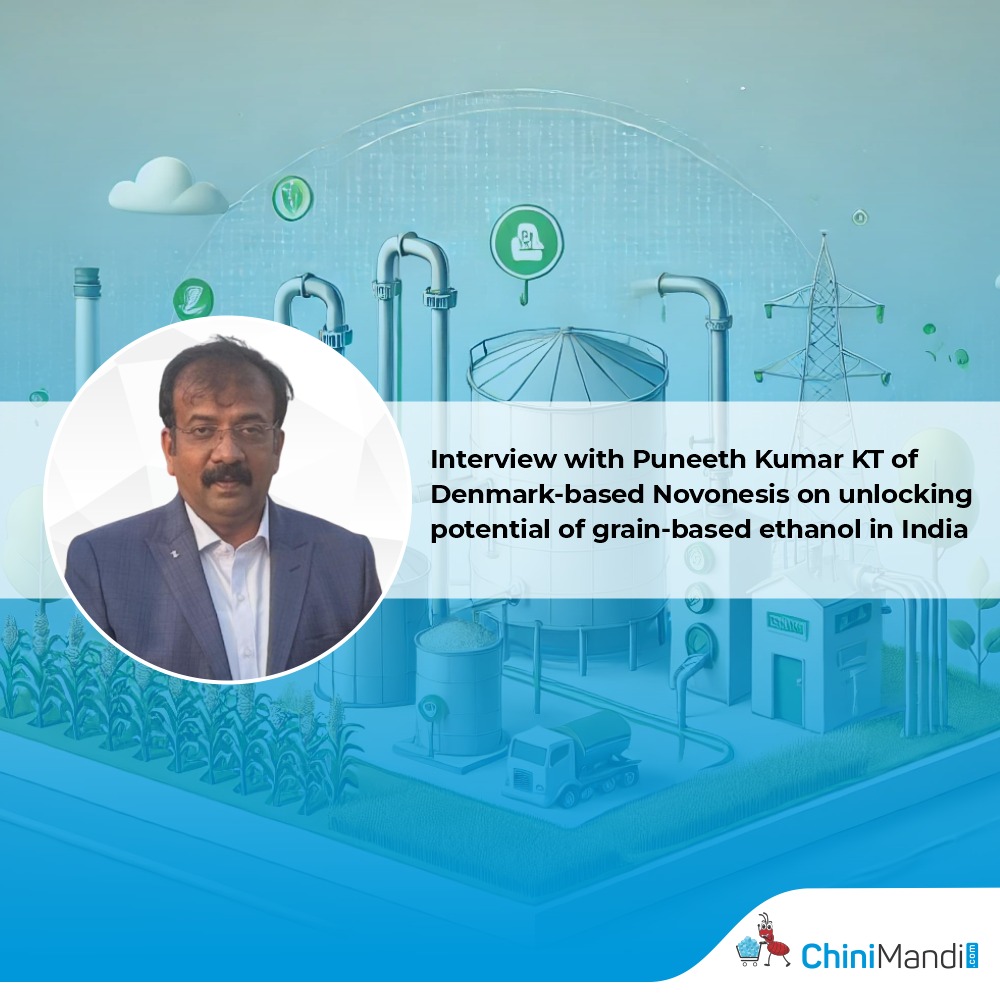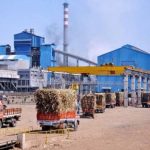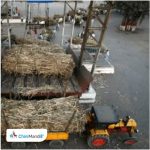India’s ethanol industry is growing, along with the increasing demand for feedstocks like maize and other crops. However, there are short-term challenges that, if addressed systematically, could propel the ethanol industry into its next growth phase. ChiniMandi speaks with Puneeth Kumar KT, Business Director of Planetary Health Biosolutions, South Asia at Novonesis (previously known as Novozymes), a Denmark-based global biosolutions leader, to explore opportunities for growth in the sector. We discussed key topics, including ethanol yield, co-product production, DDGS, ethanol costs, technological innovations, and the impact of the increasing share of maize as a feedstock.
Q. What are the key challenges in increasing ethanol yield in India, particularly in grain-based production, and how can these challenges be addressed?
Ethanol output is a function of feedstock type/quality and the robustness of the production processes. While the producers have less control on the available feedstocks, they can continually optimize the production process to maximize the ethanol yield. Since the use of corn in India (as feedstock) is recent, ethanol producers are increasingly adopting ways to optimize the production process. There are multiple opportunities to optimize, ensuring grain storage hygiene, leveraging the interchangeability of feedstocks (with different starch content), effective utilization of starch (or reducing starch losses), utility cost optimization, and downtime reduction.
Q. In your view, what innovative approaches can ethanol producers adopt to enhance both ethanol yield and the efficiency of co-product production?
Ethanol producers could increase efficiency by increasing plant throughput and maximizing the extraction of key constituents (starch, oil, and protein) available in grains. For example, corn contains bound starch which is not readily accessible through conventional methods and thus would not be consumed for ethanol production – limiting the yield from the given process. However, through advanced biosolutions – innovations in enzyme technology – the bound starch could be accessed and used in the fermentation process to produce extra ethanol. It could lead to up to 2-3% higher ethanol yield.
Similarly, in the existing process, oil is not extracted from corn, which flows into the by-product, not adding any monetary benefit to the producers. If extracted through mechanical/ biological interventions, corn oil could become an important source of revenue diversification for ethanol producers. There is also an underlying potential in valorizing DDGS for corn-based ethanol producers.
Q. With producers highlighting that current ethanol prices are not viable due to rising production costs, what strategies or technologies can help reduce these costs effectively?
Volatile feedstock costs could be addressed through increasing yield of ethanol and/or monetizing by-products that would enable superior plant economics. There are available technologies to tap into various constituents of corn to increase ethanol yield and produce value-add products including distillers’ corn oil and high protein DDGS. In case of rice, there are opportunities to valorize rice protein which can be used in many end-applications including aquaculture, cosmetics, animal feed among others.
Q. How is Novonesis leveraging the latest technological innovations to assist grain-based ethanol producers in overcoming challenges?
Biosolutions (like enzymes and yeast) have been an integral part of the grain-based ethanol manufacturing process. There has been a continuous evolution in the biosolutions offerings to manage production challenges such as utilizing available starch effectively to convert into sugar (for higher yield), reducing utility consumption, and valorizing by-products. Novonesis has been at the forefront of the evolution process and through its most advanced biosolutions, we have enabled ethanol producers to maximize their output. Novonesis’ advanced range of solutions caters to different grain/starch feedstocks (rice, corn, sorghum, cassava to name a few) and works across varied temperature ranges and process conditions to suit producers’ varying needs. These solutions are deployed with intensive technical services efforts to ensure robust output.
Q. Can you share specific examples of how your solutions have contributed to improving yield or reducing production costs?
Through its extensive collaboration with ethanol producers in this space, solutions by Novonesis have contributed positively to the growth of this industry. In our recent collaboration with a leading corn-based ethanol producer in South India (250 KLPD capacity), the plant throughput had improved by 20%– supporting significantly higher ethanol yield (upto 2%) and thereby their bottom-line. Higher throughput and better yield resulted in savings to a tune of INR 4.5 crore per annum.
Q. How can ethanol companies diversify their co-products to create additional revenue streams and reduce dependency on ethanol alone?
There are two critical co-products – DCO (Distiller’s Corn Oil) and DDGS (Distillers’ Dried Grain Solubles), monetized significantly in other markets such as the U.S and Brazil. Though niche, there’s an existing market for DDGS in the animal feed industry in India – however, there’s an opportunity to standardize the DDGS quality (texture, color, nutritional value among others) and valorize its protein content to support animal growth. A related concern is also around the presence of Aflatoxin in DDGS, requiring intervention on grain storage and handling practices. DCO is a nascent market in India but has immense potential when used in applications including cosmetics and as precursor to biodiesel production. Both these revenue streams could diversify the revenue streams for ethanol producers and aid to their financial sustenance.
Q. What steps is Novonesis taking to align with the government’s Ethanol Blended Petrol (EBP) programme targets?
Novonesis has been bringing in innovations (both in enzymes and yeast) that aid in higher ethanol yield which, in turn, support the Government of India’s EBP programme.
Q. With the anticipated rise in maize demand driven by grain-based distilleries, how is Novonesis supporting efforts to enhance crop productivity sustainably?
Feedstock availability is critical to sustenance of EBP program and expand it above 20% blending level. Grains such as corn productivity can grow significantly with the application of biosolutions in addition to innovation in seed production. Biosolutions like seed inoculants (phosphate solubilizing solutions), biofertilisers (mycorrhizal solutions), biostimulants (LCO Promoter technologies) improve plants’ ability to access and harness nutrients in the soil by freeing bound nutrients and helping create stronger root structures. And they improve the stress tolerance of crops, across diverse geographies and climates. All of these result in healthier crops and improved yield potential.
Q. How do you see the ethanol industry evolving in the coming years, and what role will Novonesis play in shaping this future?
There is a strong growth pathway for ethanol industry in India with imminent introduction of flex fuel vehicles, Government of India’s intent to blend ethanol in diesel and other similar initiatives. The next set of growth (beyond EBP programme) will require producers to become increasingly efficient and expand economies of scale to cater to underlying demand, sustainably (both financially and environmentally). This would spur expedited adoption of new/ advanced plant engineering and technologies. Besides, ethanol producers would potentially have diverse revenue base (outside of ethanol) with clear end-markets. To ensure, industry maximizes its output, the role of automation would become critically important. Over a medium term, the ecosystem is expected to evolve into large integrated biorefineries that assimilate wide range of feedstocks (crops, biomass) in a circular way to produce advanced biofuels (sustainable aviation fuel) and biochemicals.
Novonesis is well poised to support producers not only in increasing ethanol yield and value add-products but also in their transition to data-driven/automated processes that aids to their sustenance.
Q. Are there lessons from global markets that could be applied to strengthen ethanol production in India?
The growth in the markets like the U.S. and Brazil has been driven by positive policy support, enhanced industrial capabilities and the use of cutting-edge technologies to boost industrial yield. These markets are evolving towards advanced biorefining models that integrate conversion process to produce fuel, energy, and chemicals. With the right policy support from Government of India, the industry will have to expand on the economies of scale while adopting advanced technological interventions. This will propel the Indian ethanol industry to the next level, while advancing the Government’s efforts towards energy security and climate action.
Q. Beyond economic benefits, how does Novonesis ensure its innovations contribute to environmental sustainability and support the economy?
Novonesis’ solutions enable reduction in utilities/energy needs and use of fresh water during the ethanol production. With continuous focus on developing advanced, high strength product portfolio, Novonesis has also been reducing its packaging footprint substantially, having implication on emissions from logistics/ operations.

















